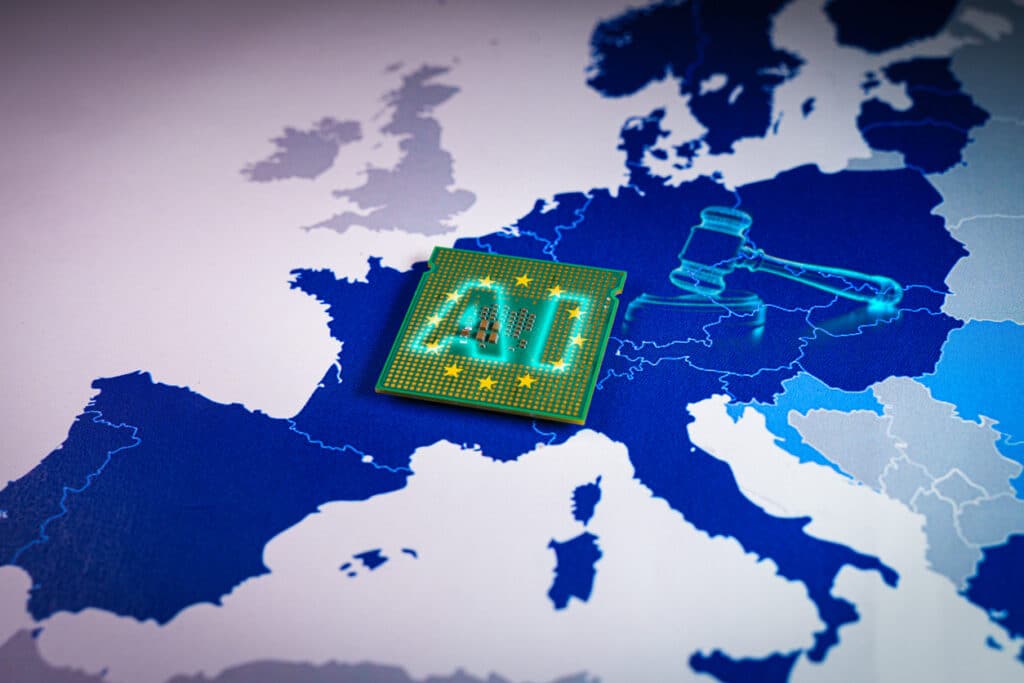What is AI Governance?
With the rise of generative AI, there is a growing need for established criteria to ensure that AI technologies and models adhere to ethical standards, regulatory compliance practices, IP protection, and privacy concerns. This is where AI governance serves as a bridge between technological potential and ethical responsibility.
AI governance refers to the framework of policies, principles, and practices that guide the ethical development, deployment, and use of artificial intelligence technologies. Proper governance is the backbone of responsible AI, ensuring that these technologies responsibly advance decision-making processes.
An AI governance framework provides organizations with a structured approach to navigating the ethical considerations of AI, ensuring transparency, accountability, and explainability of AI systems. This framework is not just about compliance; but about building trust and confidence in AI technologies among users and stakeholders, ensuring that the benefits of AI are realized responsibly and equitably.
Nine Principles of an AI Governance Framework
Following an AI governance framework is crucial for ensuring AI technologies are used responsibly. Such a framework is built on principles designed to guide the ethical development and application of AI technologies. Let’s explore these principles:
1. Explainability
Explainability means designing AI systems so people can understand why they make certain decisions. This involves ensuring that the internal workings of an AI system and how it uses input data to reach conclusions are clear and easy to follow, allowing us to understand the factors that led to the AI’s solution.
2. Accountability
Accountability means that there is a clear attribution of responsibility for the actions taken by AI systems. If something goes wrong, there should be a process in place to address issues, mitigate biases, or unintended consequences, and ensure a clear definition and adherence to legal and ethical responsibilities.
3. Safety
An AI system must be designed and deployed in a manner that ensures the safety and well-being of all users. This involves testing and validating the AI to ensure it’s designed with a focus and respect for human rights and safety, ensuring the AI acts in ways that are beneficial to humans.
4. Security
Security is crucial to protect AI systems from breaches and unauthorized access. It involves fortifying an AI system and its supporting infrastructures and data inputs against a range of attacks and safeguarding the confidentiality, integrity, and availability of both the data and the system.
5. Transparency
Transparency is about making the workings of an AI system open and accessible. It means clearly and openly sharing insights into how an AI model is developed, deployed, and used, fostering an environment of trust and openness.
6. Fairness and Inclusiveness
Fairness and inclusiveness involve designing and operating an AI system in a way that avoids bias and provides impartial, just, and equitable decisions, promoting inclusiveness and equality. This principle aims to prevent discriminatory outcomes in AI-driven decisions, ensuring that AI technologies benefit all segments of society equally.
7. Reproducibility
Reproducibility refers to the ability to recreate the results produced by AI systems under the same conditions. This principle is essential for validating the reliability and accuracy of AI technologies, enabling other researchers and practitioners to verify findings and build upon previous work.
8. Robustness
Robustness means developing AI systems and their regulatory framework to withstand tampering and manipulation, ensuring they maintain reliable and effective operation even under unexpected and difficult conditions.
9. Data Governance
Data governance refers to protecting personal data and upholding data privacy from potential risks that could compromise the integrity of the system and the data. This means the AI system should be designed and developed to respect data protection and security concerns, ensuring sensitive information and PII are protected while being able to have quick answers to questions like “What data has been used to train this model?”
Together, these principles form a robust AI governance framework, ensuring that AI systems are developed and deployed in a manner that is ethical, responsible, and aligned with societal values and norms. By adhering to these principles, organizations can navigate the complexities of AI innovation and effective AI governance.
The Importance of an AI Governance Framework
For AI to be truly valuable and widely accepted, it must align data-driven decision-making with social norms and ethical principles, and an effective AI governance framework serves as the bedrock for achieving these objectives.
Ensuring Trustworthiness and Ethical Considerations
Trustworthiness and ethics are essential components of AI governance. Trust in an AI system is built upon the assurance that they operate ethically and responsibly, respecting the rights and privacy of individuals. An AI governance framework establishes an infrastructure with clear guidelines and standards to ensure that AI technologies adhere to ethical boundaries and societal norms. By developing a system around accountability and inclusiveness, the framework fosters trust paving the way for widespread acceptance and adoption.
Data Transparency and Compliance
Central to AI governance is the concept of data transparency and compliance. AI systems rely heavily on data, and it’s imperative that this data is handled correctly and stays protected. An effective AI governance framework ensures that data collection, processing, and usage adhere to regulatory requirements and ethical standards. By promoting transparency in data practices, an AI governance framework enhances trust and confidence in AI technologies while mitigating the risk associated with data misuse or mishandling.
Better Data-Driven Decisions
An effective AI governance framework plays a crucial role in facilitating better data-driven decisions. By establishing clear processes for data governance, and aligning AI initiatives with ethical boundaries and societal norms, the framework ensures that data-driven decisions are effective and socially responsible. This leads to improved outcomes across the private and public sectors, from healthcare and finance to transportation and education.
In essence, an AI governance framework is essential for ensuring that AI technologies are data-driven, trustworthy, ethical, and aligned with social norms. By promoting data transparency, compliance, and ethical behavior, the framework enables organizations to leverage AI effectively while building trust and confidence among users and stakeholders.
The Future of AI
As we look into the future of artificial intelligence, the role of AI governance is increasingly pivotal, serving as the groundwork for the responsible development of AI initiatives and applications, and providing the necessary structure and guidelines to ensure ethical, transparent, and accountable AI deployment.
Duality Tech’s secure collaborative AI solution offers a comprehensive suite of technologies to enable secure data collaboration on AI applications. By leveraging privacy-enhancing technologies (PETs), our solution safeguards sensitive data, model IP, and input data from everyone but the owners while facilitating secure, trustworthy AI collaboration. Led by world-renowned cryptographers and data scientists, Duality has pioneered the use of PETs to address the most pressing challenges in data privacy and security. Through strategic partnerships with large enterprises such as AWS, DARPA, Intel, Google, Oracle, IBM, and the World Economic Forum (WEF), Duality continues to push the boundaries of AI governance and secure data collaboration.
Contact us to learn more about our secure data collaboration solutions and how we can help your organization harness the power of AI tools and models while ensuring data privacy, security, and compliance. Together, let’s shape the future of AI governance and drive responsible AI development forward.














